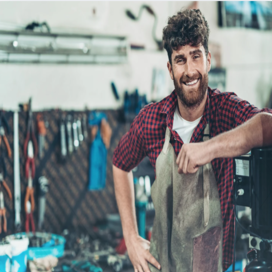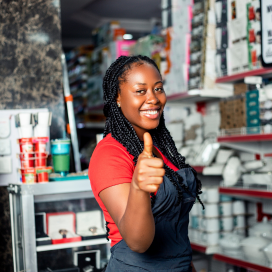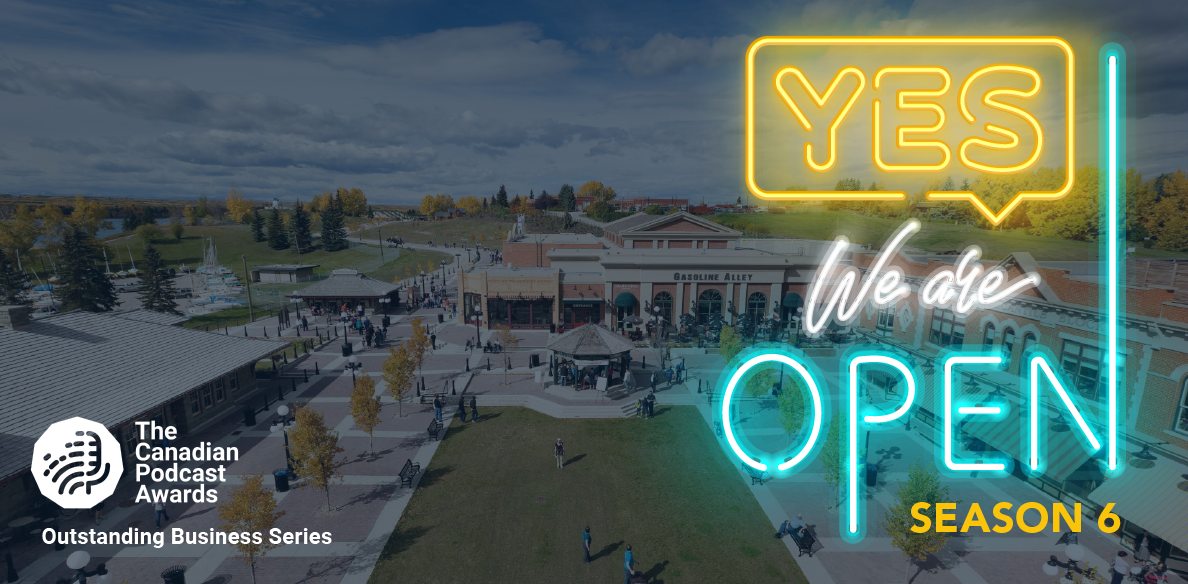
Ever wondered what it takes to turn a corporate message into a must-listen podcast? Today, on International Podcast Day, we bring to you a thorough guide to starting a branded podcast. Who better to guide us on this topic than Al Grego, host of two award-winning branded podcasts at Moneris.

Al has the superpower to turn potentially dry corporate lingo into engaging, informative content that listeners return to week after week. In this exclusive interview, he breaks down the essentials of creating and maintaining a successful branded podcast. He shares insights on how to pitch podcast ideas to managers, develop compelling concepts, identify target audiences, and perform essential research to ensure your podcast a success.
Whether you're a seasoned podcaster or just dipping your toes into the world of podcasting, get ready to learn, laugh, and start working towards becoming a professional podcaster.
-
Planning and Strategy- Learn how to come up with an idea and pitch a branded podcast to your business
-
Content Creation and Production- Learn how to brainstorm ideas for your episodes and find out what equipment do you need to record a podcast
-
Distribution, Promotion & Monetization- Learn about the three main pillars of podcasting
-
Performance and Growth- Understand how to measure the success of a podcast and build a loyal audience
Planning and Strategy
Q: First things first, what is a branded podcast?
Al: Branded podcasts are podcasts that are created and produced by corporations or businesses. Their purpose is not to be a commercial for the business but rather to add value to the listener or position the business as a thought leader in a certain field.
For example, Moneris has two branded podcasts: Just Good Business (JGB) and Yes, We Are Open (YWAO). JGB is a monthly show where I interview business leaders from across all sectors. We invite them over for good conversations. We offer value to our listeners by giving insights, tips and tricks for starting their business.
Yes, We Are Open, on the other hand, spotlights Moneris' customers. YWAO is a way for us to share the stories of our merchants to inspire other small and medium businesses. Also, it’s a way for us to thank our customers for being our customers.
Q: How can one pitch a branded podcast to their manager or employer?
Al: It's challenging because you don't want it to be just a straight commercial. You have to find something that provides value to your intended audience that would make them want to listen and have it somehow tie it back to the business. You must be creative and problem-solving to find something that adds value but also positions your brand as a thought leader or raises awareness for the brand.
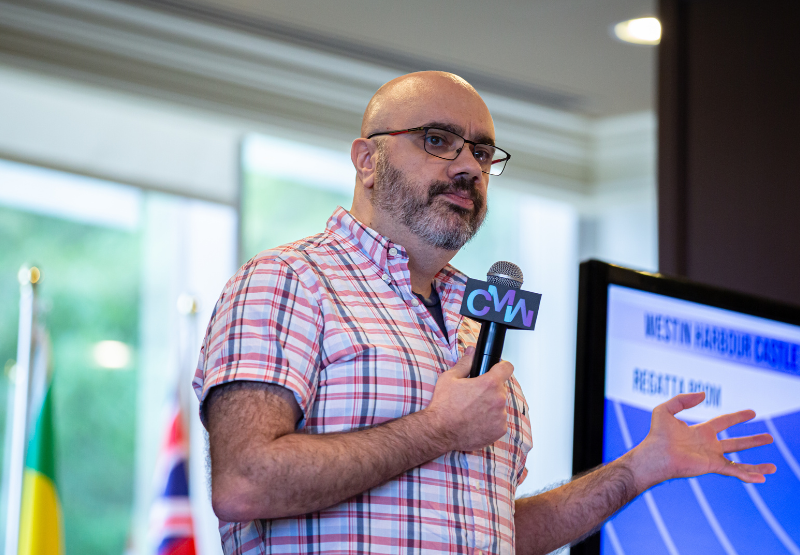
Q: How can one come up with a podcast concept or niche?
Al: We got lucky with YWAO because we have so many merchants, and JGB because we have so many partners. It's important to do your research and see what's already out there. Once you have an idea, you need to find something unique and entertaining that will stand out. PS: If you can't be educational, be entertaining.
Q: What research should one do to determine if their podcast idea would be successful?
Al: First, assess the competition. See what similar podcasts are already out there and how they're doing. Then, identify what makes your idea unique and valuable. Finally, research the topic to become a thought leader in the field.
Q: How can one identify their target audience?
Al: Your target audience should fall in line with the reason for the branded podcast. For example, if your brand is a financial services company, your target audience may be small business owners or entrepreneurs.
Content Creation and Production
Q: How can one come up with a name for their podcast?
Al: It's important to choose a name that is unique and memorable. You can do some research to see what other podcasts are out there and make sure that your name is not already being used.
When we first started our podcast, we named it 'Shop Talk.' We thought it was clever because it was about shopping, but we soon realized that there were already many podcasts with the same name, and some of them were about completely different topics. This made it difficult for us to stand out in search results.
To address this, we decided to rebrand our podcast. We knew that we needed a more unique name that would help us rank higher in search results. That’s when we came up with 'Just Good Business.'
Q: How can one come up with topics and ideas for their episodes?
Al: The process for coming up with topics and ideas will vary depending on the type of podcast you are creating. For branded podcasts, you can work with your team to come up with themes for each month or season. You can also reach out to potential guests to see if they are interested in being featured on your show.
Our podcasting process differs depending on the podcast. For YWAO, we target a specific Canadian province. We reach out to Moneris customers, inviting them to share their business stories.
For JGB, we collaborate with various teams at Moneris to determine the theme. We then identify suitable guests, often including industry leaders from our partner organizations like Visa, MasterCard, Royal Bank, and BMO.
Q: How long should each episode be?
Al: Podcast lengths vary widely. While some popular podcasts, like Joe Rogan's, can be several hours long, we aim for a sweet spot of 25-30 minutes for our podcasts. This length is convenient for listeners during commutes or other short periods, making it ideal for our business-focused content.
Q: How often should one release a podcast?
Al: There is no hard and fast rule for how often to release a podcast. However, it is important to be consistent and release new episodes on a regular schedule.
Consistency is key when deciding on a podcast release frequency. Our podcasts, JGB and YWAO have different release schedules: monthly for the former and weekly for the latter during eight-week seasons. Choose a cadence that works for you and your audience and stick to it.
Q: What equipment does one need to record a podcast?
Al: A good microphone is essential for podcasting. For remote interviews, a simple USB microphone can suffice. If you're looking for a more advanced setup, consider a mixer like a RODECaster Pro for multi-person interviews or a digital recorder like the Zoom H5 for on-location recordings. For editing, I use Adobe Audition.
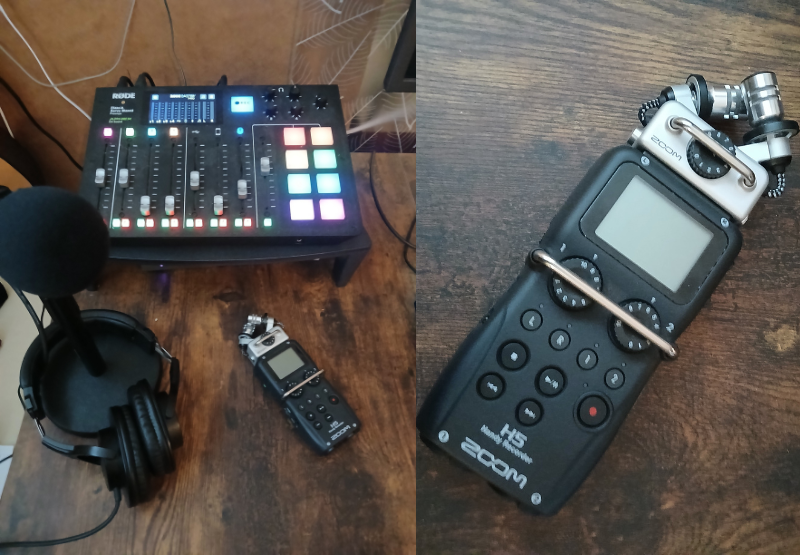
Q: How can one decide between audio-only episodes and video episodes?
Al: It depends on your podcast goals. Audio-only episodes are easier to produce and can be listened to on the go. Whether to include video depends on your personal comfort level with being on camera. Video episodes can be more engaging, but they are also more time-consuming to produce. Video production is more complex, involving additional steps like ensuring good visuals and dealing with larger file sizes. However, it offers the advantage of reaching a wider audience through platforms like YouTube.
Currently, both Moneris podcasts are audio-only, but we plan to post audiograms and eventually consider full video episodes.
Q: How can one ensure consistency and quality in their podcast production?
Al: Sound quality is king. You should also make sure that your content is consistent and engaging. Even with less-than-perfect video, good audio can still engage listeners. AI tools like Descript can significantly improve audio quality, even for Zoom interviews.
For video, focus on well-lit settings, good cameras, and interesting backgrounds to enhance the overall production value.
Distribution, Promotion & Monetization
Q: What advice do you have for someone on how to distribute their podcast?
Al: Distribution has never been easier. Podcast hosting platforms handle most of the work by syndicating your content to popular services like Spotify and Apple Podcasts. Promotion is a different challenge. With millions of podcasts, standing out requires a unique idea, high-quality content, and effective marketing strategies. Social media, paid promotions, and word-of-mouth can all play a role in promoting your podcast.
Q: What strategies can one use to promote their podcast?
Al: Leverage your network by sharing new episodes on social media and asking guests to do the same. You can also run ads for your podcast on social media platforms. Word-of-mouth is a powerful tool for promoting podcasts. Create a dedicated website for your podcast to provide a central hub for information and engagement. Building a community around your podcast can also be beneficial. Encourage listeners to connect, discuss episodes, and share your content. A blog can be a great place to promote your podcast. You can write blog posts about your podcast and include links to your episodes.
Q: How can one monetize their podcast?
Al: The short answer is you can sell advertising, create sponsored content, or offer premium content to subscribers. Monetizing podcasts in Canada can be challenging due to the smaller market compared to the U.S. The CPM (Cost Per Mille) model, commonly used for podcast advertising, requires a significant listener base to attract advertisers.
Podcasts offer a unique advantage: highly engaged listeners. Unlike radio or TV, podcast listeners are more likely to actively engage with content and pay attention. This makes podcast audiences more valuable to advertisers. Key metrics for monetization include listener count and engagement time. While download numbers are important, attention is more valuable. Podcast hosts often offer advertising services, but direct sponsorships from companies targeting your audience can be more lucrative. Building a strong community around your podcast can attract sponsors interested in reaching your niche audience.
Performance and Growth
Q: How can one measure the success of their podcast?
Al: Podcast success is subjective and depends on your goals. In Canada, monetizing podcasts can be challenging, so focus on other measures of success. Community building, contributing to a niche, and winning industry awards can be indicators of success. For branded podcasts, company-specific KPIs like website traffic and brand awareness are often used. Downloads and impressions are common metrics, but engagement time is also crucial. A podcast with a highly engaged audience is more likely to be effective, even if it has fewer downloads.
Q: How can one stay motivated and passionate about their podcast?
Al: It's important to have a clear vision for your podcast and to be passionate about the topic you are covering. It's also important to be patient and persistent. Building an audience takes time.
Staying motivated and passionate about podcasting requires finding intrinsic rewards. For a branded podcast, focus on the company's goals and how your podcast contributes to them.
Personal fulfillment and professional growth can be powerful motivators. If you're passionate about the topic, enjoy interviewing guests, or find value in the work, it's easier to stay motivated.
Seeing the podcast grow, receiving positive feedback, and contributing to the company's goals can also be rewarding. Remember, success isn't always about fame or fortune; it can be about personal satisfaction and making a difference.
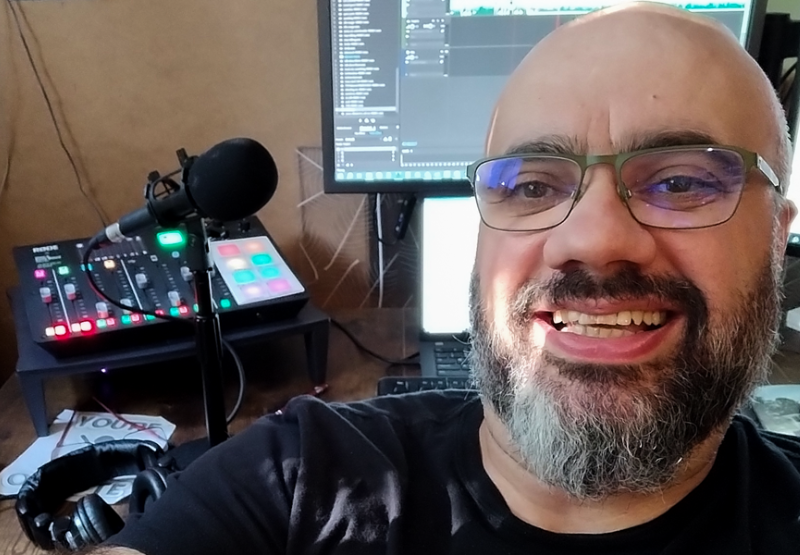
For me, being known as one of the voices of Moneris is pretty fun.
Q: What advice do you have for growing the podcast audience?
Al: Consistent production of high-quality content is essential for growing a podcast audience. Building a community around your podcast can also be beneficial. Staying topical and enthusiastic about your subject matter can help attract and retain listeners. Focus on creating engaging content that resonates with your target audience.
Q: What advice do you have for building a loyal audience?
Al:Building a loyal audience requires consistency, value, and engagement. Consistently produce high-quality content that meets the needs and interests of your listeners. Make your podcast entertaining and engaging to keep them coming back. Offer something unique that differentiates your podcast from others. Whether it's your perspective, the topics you cover, or your style, find a way to stand out. Encourage audience interaction through social media, community forums, or email newsletters. Building a sense of community can foster loyalty among your listeners.
Q: Do you have any more tips for someone who is just starting a branded podcast?
Al: The best way to start a branded podcast is to start and have fun with it. The tools and resources are readily available, and the process is more accessible than ever. Don't expect instant success. Focus on improving with each episode, and eventually, you'll start attracting a loyal audience.
Check out our award-winning podcasts: Yes, We Are Open and Just Good Business
Season 8 of YWAO kicks off on October 07. Watch the teaser
We hope you enjoyed this deep dive into the world of branded podcasts with our Podcast Guru, Al Grego. Remember: with a little creativity, a lot of passion, and a dash of Al's expertise, you can create a branded podcast that's both informative and entertaining. Happy International Podcast Day!
Author Profile
Niyati Budhiraja
Social and Community Engagement Specialist
Niyati Budhiraja is a word nerd who turns tricky business talk into fun, simple and genuinely helpful content. She writes features on inspiring Canadian businesses, crafts easy-to-follow guides and shares smart tips to help small businesses feel confident and supported. When she’s not writing or dreaming up her next blog idea, you’ll likely find her hunting down the city’s best hot chocolate.








